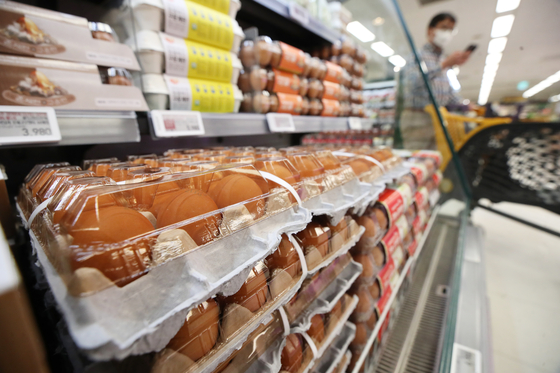In response to concerns about the’golden egg’, the government started to consider a plan to cut tariffs on imported eggs.
According to the Ministry of Strategy and Finance and the Ministry of Agriculture, Food and Rural Affairs on the 19th, the government is discussing whether to cut the tariff rate for imported eggs. An official from the Ministry of Science and Technology said, “There is an official request from the Ministry of Agriculture and Food, so we have entered the review and plan to announce it soon.”

Citizens are shopping at a hypermarket in Seoul on the 15th, where egg prices rose due to the spread of highly pathogenic avian influenza (AI). yunhap news
Recently, the government pulled out a tariff cut’card’ as the issue of killing due to the spread of avian influenza (AI) and rising egg prices. The price of domestically produced eggs is on the rise, with 30 pieces of eggs approaching 7,000 won per plate.
Currently, importing fresh eggs is subject to a 27% tariff. Tariff rates up to 30% are also applied to processed egg products such as egg liquid and egg powder. The government is looking into ways to lower the distribution price of imported eggs by using a quota tariff system that cuts the tariff rate for certain quantities.
By applying the quota tariff, the tariff rate can be lowered by up to 40%, making it possible to import non-tariff eggs. There is a precedent that the import tariff was temporarily lowered to 0% even when there was an “egg wave” in which the price of an egg rose to around 10,000 won in 2017. At that time, there was a case of emergency airlifting of foreign-made eggs by plane during the egg supply shortage.
According to the Ministry of Agriculture and Food, 18.38 million chickens and ducks were killed by 352 farms by the 18th. The government is killing not only AI-prone farmhouses, but also poultry farms within 3km of the vicinity as a preventive measure.
Of these, 888,000 breeders (chicken used to produce chicks) from 23 farm households were also killed. Unlike laying hens (for laying eggs) and broilers (for chicken), this is a damage that could erode the domestic poultry industry base later. . If breeders are scarce, laying hens and broiler production can be hit immediately.
In this situation, when considering the government’s tariff cut, domestic poultry farmers are fiercely protesting. On that day, the Korea Poultry Association issued an urgent statement saying, “With a reckless policy, we are destroying the base of egg production by killing chickens and eggs without any problems, and again wasting tremendous treasury and administrative power in the stupid administration of importing foreign eggs.” Criticized.
Sejong = Reporter Cho Hyun-sook [email protected]
